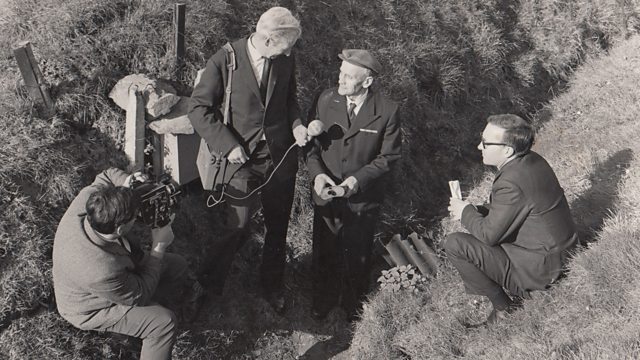Minchinhampton, Gloucestershire: Surviving the War
The Gloucestershire man who against the odds survived the fighting on the Western Front
Born in 1896, George had left school at the age of 13 and had been working on a farm when war broke out and Lord Kitchener asked for volunteers. He enlisted on 6 August at the Market House in Minchinhampton and joined the 8th Battalion of the Gloucestershire Regiment.
After undergoing training and sham battles on Blagdon Downs and Rifle practice at Bedminster he was sent to Tidworth barracks and then onto Dover and France. Packed into cattle trucks and transported overnight by rail to the front line they gradually began to hear the sound of guns in the distance. Then came the march to the front only stopping ten minutes every hour for a break.
George describes creeping into the line βlike a lot of miceβ and coming across a wooden cross that read βhere lies two British soldiers and they were brave and true, do for these British soldiers as they would do for you, pray for their soulsβ. The Battalion was then split in two with half going to the front line and the remainder in reserve. George describes being almost up to his waist in water while making his way through trenches: βOne leg would go off the duck boards and you would be soaked after no timeβ.
George and the rest of the regiment were sent to Givenchy to make a sham attack to keep the Germans away from where the British soldiers were fighting at the Battle of Loos. George and his regiment were then relieved and sent for a rest in nearby fields lying on their ground sheets and being given an issue of rum which they added to their tea.
They marched for three days to Amiens and again as they got closer to the Somme they could hear the sound of the guns as the German trenches were pummelled for days and nights. The Glosters, Worcesters, Cheshires and Wiltshires were moved into the reserve trenches. On the third morning it was finally their turn to go over the top. As they made their way along they could hear the moans of those injured men who had gone before them, but little could be done to help them.
Private Harold Alden of 8th Battalion was also present at the battle and wrote a poem dedicated to his comrades who had fallen that day.
After reaching the German trenches, George was then sent back to deliver a message and as he made his way through the dead, he came across a German lying on his back with his right foot off just above the top of his shoe. He begged for water, but George didnβt have any on him so promised to return as soon as he could. On his return he found the soldier in a shell hole; he pulled him out but he had already died.
George, who was by now with the Machine Gun Corp, was sent to Messines where Hill 60 exploded. He clearly remembers thinking the world was coming to an end as the explosion shook the earth around him like a pendulum preventing them from going over the top. He remembers being told that some 1,760 Germans were killed on Hill 60. He says when they finally reached their trenches they gave up without a fight flinging their arms behind their necks while others remained where they died as a result of shock.
From there George was sent to the Menin Road during the Battle of Passchendaele where he was injured for the first time with a piece of shell through the back and the breast bone. He was carried to safety on a stretcher and taken to hospital. The doctor told him he was lucky to survive. On his return to the Somme, he managed about three months before being injured for a second time, being hit by bullets through the thigh, narrowly missing the bone. He scrambled to a Red Cross Field Hospital for treatment and then to Calais and on to Huddersfield Hospital where he saw out the remainder of the war.
Location: Minchinhampton, Gloucestershire GL6
Image: George Cribley returns to the Western Front for ΒιΆΉΤΌΕΔ Points West in the 1960βs. Les Leach is the cameraman. Picture courtesy of Les Leach.
Duration:
This clip is from
Featured in...
![]()
ΒιΆΉΤΌΕΔ Radio Gloucestershire—World War One At ΒιΆΉΤΌΕΔ
Places in Gloucestershire that tell a story of World War One
![]()
Memory—World War One At ΒιΆΉΤΌΕΔ
Memorials and the commemoration of wartime lives
More clips from World War One At ΒιΆΉΤΌΕΔ
-
![]()
The loss of HMY Iolaire
Duration: 18:52
-
![]()
Scotland, Slamannan and the Argylls
Duration: 07:55
-
![]()
Scotland Museum of Edinburgh mourning dress
Duration: 06:17
-
![]()
Scotland Montrose 'GI Brides'
Duration: 06:41







